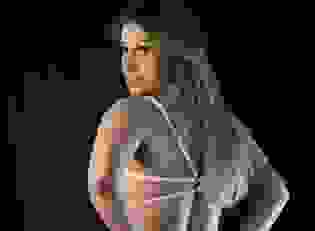Note: You can change font size, font face, and turn on dark mode by clicking the "A" icon tab in the Story Info Box.
You can temporarily switch back to a Classic Literotica® experience during our ongoing public Beta testing. Please consider leaving feedback on issues you experience or suggest improvements.
Click hereBut when I went up to bed, the War was too present. On the wall above the bedroom fireplace were four photographs. There were James and Alfred in their brand-new uniforms as recently appointed second lieutenants, looking young and fresh-faced - nothing like the lined and haunted face when I had last seen Alfred as an acting Major. Beside them were two women - James' girlfriend Matilda, and me. Matilda had been a volunteer ambulance driver but had been killed by a direct hit from a German shell as she was driving close to the front line. It had been two days after James' death in action. Matilda had never known that James was already dead. Of the four, I am the only one still alive.
I sat down on the edge of the bed and cried. I wasn't crying just for those three, but for those damaged by the war such as Sergeant Abram, Jessica's husband, Gerald and my father, together with all the men I had treated in hospital who had died or sent back to England as wrecks of their former selves. Could I face the horrors of the hospital In France again? That had changed me too.
Perhaps sleeping in what had been Alfred's room together with seeing his photograph made Alfred more real again. I seemed to have him in bed with me, with his arms around me, comforting me. He was young again, as he had been when we first met. This time there was no passionate coupling, just two people cuddling each other in our grief.
+++
After breakfast Gerald had intended to take me to see the two properties I had inherited but his duties at the training school meant he couldn't. Instead I went with Caroline and Amelie. However I did meet Mr Simon's agent, Mr Hughes, who had been running all three estates since James and Alfred went to war. He came with us to advise me.
We went first to what had been Alfred's to the tenant famer using the whole estate. Mr and Mrs Jones were in their late sixties. But for the War, they would have retired but they were helping their son Thomas who was in his forties and a veteran of the Boer War in which he had been a cavalryman and still had a limp from wounds.
Over tea and cakes we discussed their farm. They were worried, not just because of a lack of men who had volunteered, and they expected to lose more to conscription, but also a shortage of horses since so many had been taken to France. They wanted to bring into cultivation some land with heavy soils that hadn't been ploughed for generations, if ever, but were worried that the few horses they had couldn't cope. I asked about traction engines. Mr Jones made a face.
"Miss Ruth," he said, "while there are contractors who could plough with traction engines and cables, they cost money, more than we could afford. As for our own traction engine? Yes, they exist, and we would be allowed to buy one, but with what?"
"You pay me rent," I said. "What if that rent was reduced to pay for the contractors or a traction engine, or both?"
Both Mr Jones and their wives were shocked.
"But, Miss Ruth, that might mean we only paid you a quarter of the usual rent this year," the elder Mr Jones said.
"So what? I don't need the money and it would be an investment for the war effort and for this farm for the future."
"You are sure, Miss Ruth?"
"Yes. And if you haven't got the capital to buy a traction engine now - I could lend it to you."
The older Mr Jones sat back in his chair. He was surprised. His wife spoke for him.
"Miss Ruth, we were worried about meeting you. You know nothing about running an estate or a farm. We were afraid you might be an awkward landlord, but this? This is amazing and will make our work so much easier. Thank you."
"What I do know is that the War has made life difficult for everyone. If contractors and a traction engine would help? Why not? I turned to Mr Hughes, the estate agent. There would be no problem, with that, would there be, Mr Hughes?"
"Of course not, Miss Ruth, It is your estate, your money, and your decision but it sounds good for everyone. But there are rare tractors, smaller and lighter than traction engines, that might be better. I don't know. I and Mr Jones would have to find out."
The elder Mrs Jones hugged me. When we left all four came out to wave goodbye, smiling broadly.
After introducing me, Amelie and Caroline hadn't said much.
"Ruth?" Caroline said. "We had hoped you would be a good landlord to people who have been good to the family for years. Now we know you are and will be. You have made the Joneses very happy."
"Why not? I don't need the money. It will be an investment for the future."
"We are going to the Dower House," Caroline said. "The staff will have made a cold luncheon for us. Unlike on Albert's estate you have a house and staff. They will be worried about what you might do, But after lunch we will meet the four tenant farmers who rent most of the estate except the parklands."
"I won't want to change anything, Caroline, unless the War Office agree. If they do? The tenant farmers won't be affected but the staff might be busy."
"You might need more. There is only a basic staff since James hadn't been to the Dower House since the War started. They are keeping it in good order but with no one from the family present, They don't need many people, except gardeners. But even the gardeners are fewer than they were because some have joined the army."
"Mss Ruth," Mr Hughes said, "the staff at the Dower House are worried. There are a lot of them doing not much. Yes, they are keeping the house and estate in good order and even improving it, but with no family resident they think some will be discharged."
"Even if the War Office doesn't agree, Mr Hughes, they need not worry. The estate can afford them. If the War Office agree? We'll need more staff. Which reminds me. The tenant farmers? Do they need traction engines too?"
"Probably. There is a national shortage of horses and so many men have gone to war. Using a contractor will add about a quarter to the productive land for the Jones family but without a traction engine they would struggle to use that much more. There are three tenant farmers around the Dower House. Their farms are slightly smaller than the Jones' but they also could expand their crops if they could plough heavy land. But I think all three would appreciate a traction engine. Can you afford four, Miss Ruth?"
"I think so. How much are they?"
"I saw an advertisement in a farming magazine a few weeks ago. I think, but I will have to check when we get back to Mr Simon's house, that they cost about six to seven hundred pounds each."
"Mr Hughes, before the war I thought I was reasonably well off on a thousand pounds a year. Now I have inherited ninety thousand pounds and an income from both estates of nearly six thousand pounds a year. But since the war started I have been living on my nurse's pay. Four traction engines, and the contractors' fees, would easily come out of a year's income I don't need."
"Are you sure, Miss Ruth?, That is a lot of money."
I sighed.
"Mr Hughes. I didn't want to inherit from Alfred. I wanted him, not what he owned. I didn't expect to inherit from him, and certainly not from James. As a single working woman with her own income apart from my pay, I don't need the income from the estates. What I have inherited from both brothers is the responsibility for all the people on the estates. That responsibility is far more important to me than the income. If spending money will make their lives easier and the produce from the estates better? Why not?"
"Alfred would have been proud of you, Ruth," Caroline said. "And James would have been even more so. James cared more than Alfred, although Alfred was changing - thanks to you. Gerald will be pleased as well. He was worried that the estates he had been managing on his sons' behalf might suffer with a stranger as owner. But..."
Caroline leant across the carriage and kissed me.
"And now we know what Alfred loved about you, Ruth," Amelie said.
I couldn't stop a tear rolling down my cheek. I would far rather have been working with Alfred, not on my own, not his widow, not even his former fiancée, just the woman who was his girlfriend and might have been more if we had had time...
Amelie hugged me and passed me a handkerchief to wipe away my tears.
"Mr Hughes? I asked, "How bad is the shortage of horses?"
"Grim," he replied. "Take the two pulling this carriage. They are very old for horses and should have retired. Yes, they can pull this light carriage on good roads, but not far. Five miles a day is all we could ask of them. Almost all the good horses, particularly the heavy horses that pulled farm equipment, have been requisitioned for the army. Where we used to pull a plough with two horses, we now need four or even six. That number takes management and the ploughing is slower. Your traction engines will mean that the few horses we have left can be used on lighter tasks."
"Horses need grass and hay. Traction engines need coal. Would that be a problem?"
"No, Miss Ruth. Near the Dower House is an old quarry that was used to build the house. That exposed a seam of coal. It's not as good as best Welsh steam coal but we have been using it to heat the Dower House and Mr Simon's mansion. It is good enough for traction engines."
"That's good. What about other farm machinery, Mr Hughes?"
He rubbed his chin.
"The four farms share an older threshing machine. It used to be run by a horse mill. You know that the horses walk in a small circle driving a cog wheel but since we are so short of horses it is now run by a belt from the water mill."
"A water mill. Can we see that?"
"I don't see why not. The miller is one of your tenants, Miss Ruth."
"OK. When we get to the Dower House, we'll have lunch, and then I'd like to see all the servants, inside and outside, Mr Hughes. And my tenants."
"The servants? No problem. Your butler can arrange that. The tenants? They're all coming at three o'clock for tea and cakes and to meet you, Miss Ruth."
At that point we arrived in front of the Dower House. Unlike Mr Simon's large mansion, this was a four-square Georgian property. I knew it had six formal rooms and ten bedrooms for family and guests but it didn't seem over large. The Butler and Housekeeper were standing on the front steps to welcome us. Mr Hughes introduced me. Amelie and Caroline were well known.
We went into the dining room where a cold luncheon was already displayed. Mr Hughes had a quiet word with the Butler who nodded and disappeared. His wife, the housekeeper, and two maids were hovering around ready to get anything we needed but it was all there.
+++
At two o'clock we went out on to the terrace to see all the maids etc and the outside staff assembled, all dressed in their best uniforms.
The butler introduced me.
"Ladies and gentlemen, I am the new owner of this estate. I didn't want to be, but now I am, I will try to be a good manager. Firstly I want to say that despite the War, every one of you will still be employed. I'll go further, if because of the new conscription laws, any of the men are sent off to war, their positions here will be available when they return and their families can stay in their houses. Any man who joins the forces will have half of his pay as a worker on this estate paid to his family.
At the moment there is a possibility that the Dower House and its estate could become a rehabilitation place for injured officers. If it does, I will be resident here and not only will I need all of you, but there will be nurses including VADs and more locally recruited staff. . I should know within the week if that is to happen. As soon as I know, I will make sure you know too. But whatever happens, I need all of you and I thank you for all you have done and are doing. Thank you."
Some of the staff were shocked but there was also obvious relief that their jobs were safe. The Butler called for three cheers for Miss Ruth, The first cheer was half-hearted as some were still taking in my words. The last one was loud and enthusiastic.
+++
Just before three o'clock, Mr Hughes said:
"This will be a smaller group of ten people, Miss Ruth. There will be three farmers, their wives, the miller and his son, and the blacksmith and his wife. The blacksmith is only your tenant for the forge and a field where he keeps the horses before and after shoeing."
"OK, thank you, Mr Hughes."
I walked into the dining room with Mr Hughes, Caroline and Amelie. Mr Hughes introduced me to everyone. I gave a modified version of the speech I had given to the servants and then announced the possibility of traction engines. That pleased the farmers. We then mingled. I spoke to the miller who had been introduced to me as 'Mr Dusty'.
"Mr Dusty?" I asked. "Surely that isn't your real name?"
"No, Miss Ruth, but everyone calls me hat. They can't pronounce my real name. My grandfather was a refugee from Russian Poland and they can't even spell my surname, let alone speak it. So I'm Mr Dusty to everyone."
"OK, Mr Dusty. How is the mill? Is it in good condition?"
"Yes, Miss Ruth. Apart from being millers, I and my son Georgi, are millwrights. We can fix everything ourselves but..."
"But?"
"It is a water mill and sometimes, often in late summer or autumn when the cereal crops are harvested, we don't have enough water to run the mill."
"You have a power take-off to run the combine harvester?"
"Yes, but that is sometimes needed when we don't have the water."
"Could a traction engine run the mill?"
"It could run the harvester, but that is an old machine that keeps breaking down. A traction engine could run the harvester but it couldn't run the mill."
"Why not?"
"Miss Ruth, the mill has three sets of heavy stones. While, in theory, a traction engine might just about have enough power to turn the wheels, the belt drive couldn't cope. It would slip because the load is too much."
"So what you need is more water?"
"Yes but the stream nearly dries up in a hot summer. The mill pond is small, too small."
"Could it be enlarged?"
"It could but it doesn't need to be. The mill pond was large enough but now had forty years of silt that has reduced its capacity to about a quarter."
"Mr Hughes?"
He came across to me.
"The mill pond is heavily silted, Could it be cleared out?"
"Yes, Miss Ruth, but it would take dozens of men for months if done by hand, and because of the war we don't have dozens of men. But I think the traction engine contractors did one about ten miles away, last year."
"Please can you and Mr Dusty find out if that is possible and let me know the cost?
"Yes, Miss Ruth." Mr Hughes said.
"Thank you, Miss Ruth," Mr Dusty said.
"If it isn't too expensive, Mr Dusty, I will pay. We need a working mill."
+++
Back at the house I had a letter from France, forwarded from my London address. I had written to the nurse in charge of the field hospital where Alfred had died, asking for details. They made me cry because I could see the scene from my own experience.
Alfred had been fatally injured. When he arrived at the field hospital he was unconscious. He had lost both his lower legs and had a large stomach wound. The staff had seen that there was nothing they could do to save him. They had given him a large dose of morphine and left him to treat those wounded who had a chance of survival. The exact time of death was unknown. When a nurse next passed his cot, about half an hour later, he was dead.
+++
I wrote a short letter to the solicitors asking them to draft a temporary will leaving everything to my parents. I emphasised that it was temporary just in case I went back to France. I would think longer about a more permanent will but would sign the temporary will in a couple of days' time when I was back in London.
+++
That night, in what had been Alfred's bedroom, I dreamed about him for the last time. He seemed to be the young man of the picture on th wall. We appeared to make love and afterwards, with my head seeming to be resting on his shoulder, he talked.
"Ruth, " Alfred said in my dream, "Thank you for looking after my people. I know I, and James, neglected them before the war. Part of our excuses is that we were too young. Don't blame Mr Hughes, He was trying his best but working hard for our father and neither James or I gave him the money he needed for our estates, Now you can and are. Thank you.
But now? You must move on. I'm dead and in the past. You should look to the future, not what might have been. You are alive and have the responsibilities that James and I have given you. I meant well but I hadn't realised what I would be asking from you. I made you the beneficiary of my will because I loved you and wanted to marry you. But what I intended and what you have to do now are very different. Your inheritance may be unwelcome but I know you will act in the best interests of all those who are now your responsibility. Thank you. Goodbye, my love."
I cried myself to sleep. I didn't even have the dream of Alfred to comfort me. I was alone. Or was I? I had Alfred's father Gerald, his two mistresses Amelie and Caroline, and my parents. All of them loved me.
+++
It took almost the whole of the next day to get to Lydd. I stopped at the solicitors to sign the temporary will and took a copy to give to my parents. I didn't have time to visit the London house.
I was surprised at first when I saw my father. He looked happier and younger than he had since the start of the war. But he was in a wheelchair with two VAD nurses pushing him. He introduced me.
"Ruth, this is Miss Angela and Miss Maureen. They are my crutches," he said. "I can't use crutches or a stick because of my hands, so when I need to stand, these two prop me up. The doctors think my legs will be capable of supporting me in about a month and then I will get rid of the wheelchair. I won't miss that but I will miss them..."
"He won't," Angela said. "We are part of the first aid team of a doctor and four VADs. We aren't very busy with the trainees - a few cuts and bruises. Our main task is to look after the staff, all of whom are injured officers. Looking after your father, the commandant, is the most important, so even after he's out of the wheelchair we'll still be with him."
"Thank you, Ladies," I said.
"Even the doctor," my father added, "is a wounded veteran. He lost his right arm, so the VADs are very useful to him."
The two nurses wheeled my father into his official residence where a maid brought tea for all four of us.
"Ruth, Angela and Maureen are not just nurses. They are my secretaries. I have no secrets from them. How could I? They are with me from getting up to going to bed. So anything we talk about has to be shared with them, OK?"
"Of course," I replied.
My father started by expressing his condolences for the death of Alfred.
"Miss Ruth," Maureen suddenly blurted. "You aren't wearing black!"
"I know," I said sadly. That would be presumptuous of me. Although Alfred's father treats me as one of his family, I'm not. If Alfred had proposed and I was his fiancée, I would wear black. But Alfred hadn't so the most I can do is this."
I pointed to the silver sweetheart brooch with the title of Alfred's unit. Behind it were cloth black petals.
"That's sad," Maureen said.
"I know. But if I wore black I would be offending some people's sensibilities. Not Alfred's family. They'd understand. But his, now my tenants? They might be shocked. Which reminds me. Dad?"
I reached in my reticule and produced the copy of the will.
"If I'm going back to France shortly, I will be in danger and I am now the owner of two estates. I had to change my will and this is a temporary expedient until I've thought further. Until I've considered, if I have time, I have made you and Mum my heirs..."








